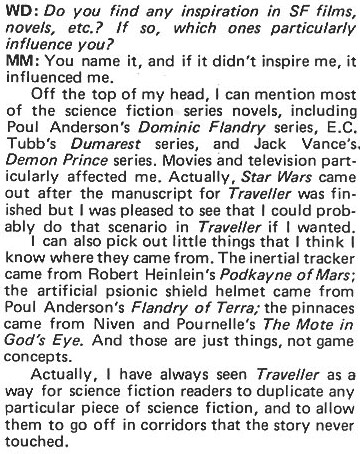I think it’s charitable to describe Traveller as a product of the '70s. The boxy or wedgy spaceships (which were expected to land on the planets rather than being cheaply unstreamlined and sending shuttle down from orbit), the tendency to treat only planetary surfaces as important and space as just the thing you passed through to get from one scenario to the next, and the inclusion of John Campbell-style psionics, gave it a 40s/50s feel for me. (A cartoon caption - unrelated to SF - that I used to borrow as a description of the game was “I have seen the future - and it’s '50s revival!”) It all seemed rather pre-Star Trek to me, and definitely passe compared to things like Larry Niven’s stories, which were my touchstone at the time.
(Yes, I know that Trek and Niven had psionics, which were still being treated as hard SF in the 60s. But they both had a glossy, ultramodernist, high-energy aesthetic which was missing from Trav.)
At a guess, I’d say that the strongest influences were the Dumarest stories (competent adventurer uses spaceships as a way to get from one Earthlike planet to another and takes an odd job on each), and to a lesser extent Jack Vance’s SF stories (the heavy emphasis on what we should have called the picaresque).
It also seems in retrospect that Traveller was even more clearly the product of wargamers fumbling their way towards inventing roleplaying than D&D was. Scenarios were tactical challenges for small groups of ex-military professionals to resolve; there was a feeling in many quarters that any scenario or mini-campaign had to come with a pregenerated set of PCs, suited to tackle it - you weren’t going to throw interesting problems at people’s characters, you were going to give people characters and a problem for those specific characters to solve. The party was a one-off group to match the one-off scenario. Which makes the random character generation rather weird, but heck, we were all younger then.
Then the implicit background idea from things like the star system and sector generation rules was made more explicit, and GDW’s boardgames were tied into it, and we got huge and active stellar empires instead of independent star systems in tenuous contact through a skimpy network of free traders. Which didn’t really suit the initial concept of “You wander into town and turn out to be the only people who can solve the local problem”, but everyone fudged it. It now seems to me that, if you’re going to use the canon future history, the best period for classic Traveller games would actually be the Long Night - no stable interstellar empires, lots of lightly-populated independent worlds just hanging on to some kind of technology, trade and communication limited to the efforts of a few independent free traders, stuff to excavate from a lost age of higher technology, and heck ,really ambitious PCs could even try to create interstellar states - but that’s one period that’s never been written up properly, I guess because Tubb and Vance are less influential than Star Wars.

